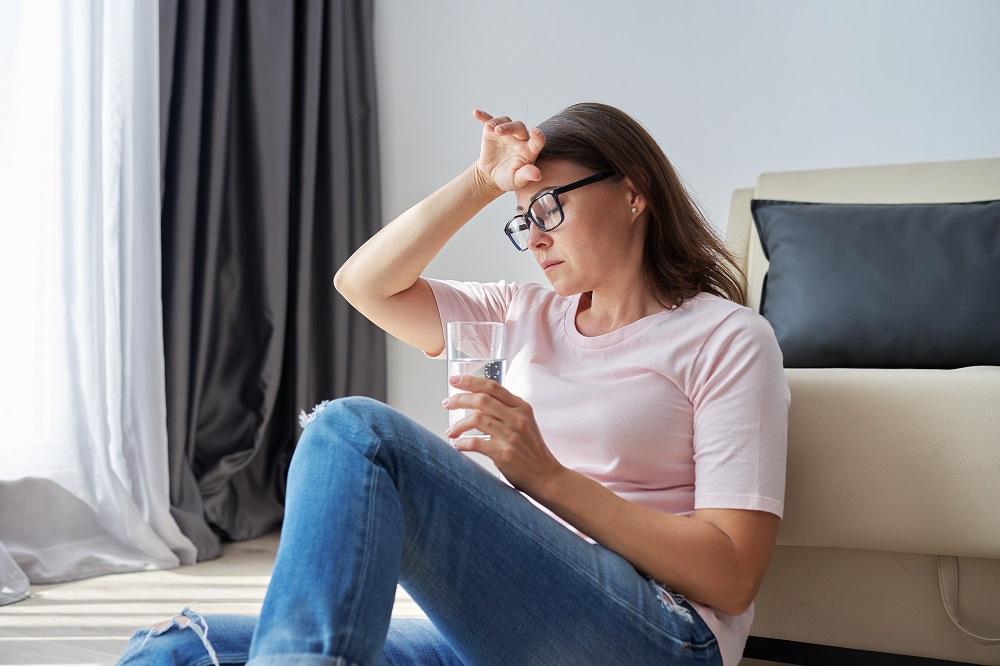Contents
10 Signs Of Early Menopause
Early menopause, also known as premature menopause, occurs when a woman enters menopause before the age of 45. It can be natural or induced by certain medical conditions and treatments. Recognizing the signs of early menopause is crucial for seeking timely medical advice and managing symptoms effectively. Here are the common signs and symptoms of early menopause:
1. Irregular Periods
One of the most noticeable signs of early menopause is a change in menstrual patterns. Periods may become irregular, less frequent, or completely stop without any apparent reason. Any significant change in the menstrual cycle should be discussed with a healthcare provider.
2. Hot Flashes
Hot flashes are sudden feelings of warmth, usually most intense over the face, neck, and chest, which can make the skin red and sweaty. Hot flashes are very common during menopause and can occur at any time of the day or night.
3. Night Sweats
Closely related to hot flashes, night sweats are severe hot flashes that occur at night and can disrupt sleep. These may be accompanied by chills, making it difficult to get a good night’s rest.
4. Vaginal Dryness
Reduced estrogen levels during early menopause can lead to vaginal dryness, which may cause discomfort during sexual intercourse and increase the risk of vaginal infections.
5. Mood Swings
Many women experience emotional symptoms such as mood swings, irritability, and increased anxiety or depressive symptoms. These changes can be abrupt and significantly affect one’s quality of life.
6. Decreased Libido
A reduction in sexual desire or libido is common during early menopause, often coupled with other physical changes like vaginal dryness that can make sexual activity uncomfortable.
7. Sleep Problems
Issues such as insomnia or disrupted sleep are common during early menopause. Night sweats can exacerbate these problems, leading to chronic sleep deprivation.
8. Difficulty Concentrating and Memory Lapses
Cognitive changes, including problems with concentration and memory, are frequently reported by women going through early menopause. These symptoms are often referred to colloquially as “brain fog.”
9. Weight Gain
Hormonal changes during menopause can lead to weight gain, especially around the abdomen. This can occur even without changes in diet or physical activity levels.
10. Dry Skin, Eyes, or Mouth
Lower estrogen levels can affect the moisture levels in the skin and mucous membranes, leading to dryness of the skin, eyes, or mouth.
What Causes Early Menopause?
Here’s a breakdown of the common causes of early menopause:

1. Genetic Factors
A significant predictor of early menopause is family history. Women whose mothers or sisters experienced early menopause are more likely to go through the same. Specific genetic disorders, such as Turner’s syndrome or Fragile X syndrome, can also predispose women to early menopause.
2. Autoimmune Disorders
Autoimmune conditions, where the immune system mistakenly attacks the body’s own tissues, can affect the ovaries as well. Conditions like rheumatoid arthritis, thyroid disease, and lupus have been linked to premature ovarian failure, leading to early menopause.
3. Surgical Intervention
Surgical removal of the ovaries (oophorectomy) for medical reasons, such as ovarian cancer or severe endometriosis, immediately induces menopause. Similarly, a hysterectomy that removes the uterus but leaves one or both ovaries will not cause immediate menopause but may lead to earlier onset due to a reduced blood supply to the ovaries.
4. Chemotherapy and Radiation Therapy
Cancer treatments, particularly chemotherapy and pelvic radiation, can damage ovarian tissue, reducing their function and leading to early menopause. The impact varies based on the type of chemotherapy, the age of the patient, and her ovarian reserve before treatment.
5. Chromosomal Abnormalities
Women born with chromosomal abnormalities, such as Turner syndrome (where part or all of one of the X chromosomes is missing) or trisomy 18, are more likely to experience premature ovarian failure.
6. Lifestyle Factors
Certain lifestyle factors can influence the timing of menopause. Smoking has been shown to advance the onset of menopause by several years. Other factors, such as low body mass index (BMI), excessive alcohol consumption, and lack of exercise, might also play a role in diminishing ovarian function prematurely.
7. Viral Infections
In rare cases, viral infections such as mumps can affect the ovaries, potentially leading to early menopause if the damage is significant.
8. Idiopathic Causes
In many cases, the exact cause of early menopause is unknown. These cases are classified as idiopathic premature ovarian failure, where the ovaries stop functioning properly without a clear reason.
What Is The Earliest Age For Menopause?
The earliest age for menopause is technically in your 20s, although it’s very uncommon. Most medical professionals define:

- Premature menopause: Menopause that occurs before age 40. This affects about 1% of people assigned female at birth (AFAB).
- Early menopause: Menopause that occurs between 40 and 45 years old. This is experienced by about 5% of people AFAB.
How Is Early Menopause Treated?
Here’s an overview of the common approaches to treating early menopause:
1. Hormone Replacement Therapy (HRT)
HRT is the most common treatment for managing the symptoms of early menopause. It involves the administration of estrogen and, if the uterus is intact, progesterone to help alleviate menopausal symptoms such as hot flashes, night sweats, mood swings, and vaginal dryness. HRT also helps prevent osteoporosis by compensating for the rapid decline in estrogen levels that accompanies early menopause.
- Benefits: Besides symptom relief, HRT can help reduce the risk of osteoporosis and cardiovascular disease, which are elevated due to the earlier decline in hormone levels.
- Risks: HRT is associated with an increased risk of certain conditions, such as breast cancer, blood clots, and stroke, especially if started later and used for a prolonged period. Therefore, it’s crucial to personalize treatment and regularly review it with healthcare providers.
2. Non-hormonal Medications
For women who cannot take hormone therapy or choose not to, non-hormonal medications can help manage specific symptoms:
- Antidepressants: Certain low-dose antidepressants can reduce hot flashes and help with mood stability.
- Gabapentin: Originally used to treat seizures, gabapentin can be effective in reducing hot flashes.
- Clonidine: This medication, typically used to treat high blood pressure, can also provide relief from hot flashes.
3. Lifestyle Modifications
Lifestyle changes are a cornerstone of managing early menopause symptoms and improving overall health:
- Diet: A balanced diet rich in calcium and vitamin D is crucial to support bone health. Increasing intake of fruits, vegetables, and whole grains can also help manage weight and improve cardiovascular health.
- Exercise: Regular physical activity, including weight-bearing and muscle-strengthening exercises, helps maintain bone density, improve mood, and enhance overall physical health.
- Smoking Cessation: Smoking accelerates bone loss and can worsen menopausal symptoms; quitting smoking is highly beneficial.
- Stress Management: Techniques such as yoga, meditation, and mindfulness can help manage stress and improve psychological well-being.
4. Vaginal Estrogen
For women experiencing severe vaginal dryness, topical vaginal estrogen creams, tablets, or rings can be used to relieve symptoms without the risks associated with systemic hormone therapy.
5. Supplements and Alternative Therapies
Some women find relief from menopausal symptoms through natural supplements and alternative therapies, although these should be used cautiously and with professional guidance:
- Phytoestrogens: Compounds found in certain plants that can mimic estrogen, such as soy products, may provide mild relief from hot flashes.
- Herbal Supplements: Black cohosh, red clover, and evening primrose oil are popular, but their efficacy and safety are not well-established and can vary widely.
6. Regular Health Screenings
Because early menopause increases the risk of osteoporosis and cardiovascular disease, regular health screenings are essential. Bone density tests, cholesterol checks, and blood pressure monitoring should be part of ongoing health care.
Frequently Asked Questions
What is early menopause?
Early menopause is when a woman starts to experience menopause symptoms before the age of 45. It involves hormonal imbalances affecting estrogen and progesterone, causing symptoms like irregular periods, weight gain, and hot flashes.
What are the causes of early menopause?
Early menopause may be caused by ovarian damage, chemotherapy, genetic predisposition, and autoimmune diseases. It’s crucial to seek medical advice if you believe you are going through early menopause.
What’s the difference between early and premature menopause?
Menopause that occurs before the age of 40 is considered premature, while early menopause happens between ages 40 and 45. Both situations require medical attention for proper management.
How are the symptoms of early menopause managed?
Treatment options for early menopause include Menopausal Hormone Therapy (MHT) and contraception. It’s also helpful to manage the emotional impact via services like the Daisy Network, and to adopt a personalized treatment plan covering physical, hormonal, emotional, and mental aspects.
What is an effective way to transition into early or premature menopause?
Adopt a personalized treatment plan covering physical, hormonal, emotional, and mental aspects. This, along with Menopausal Hormone Therapy (MHT) or contraception, can provide a smoother transition into early or premature menopause.
I am a medical student with experience and interest in Women’s health and well-being.
